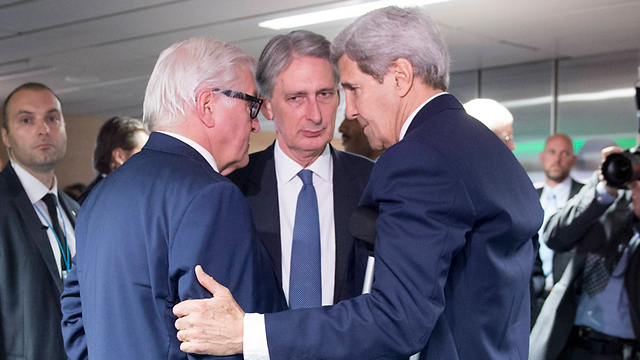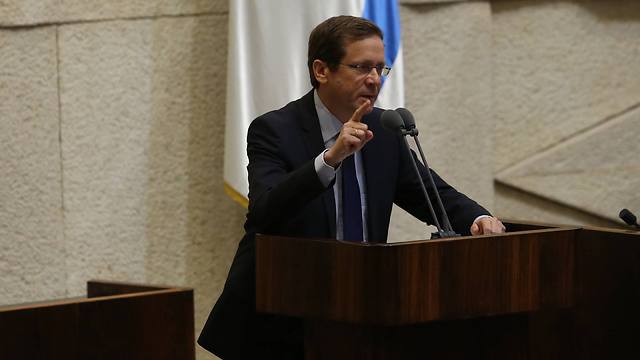
UK's Hammond: Israel wants permanent state of stand-off with Iran
British foreign secretary to visit Israel to discuss nuclear deal with Netanyahu; tells UK parliament that Israel would not have been satisfied with any kind of deal with Tehran.
Britain's Foreign Secretary Philip Hammond will arrive in Israel on Wednesday evening to discuss the nuclear deal signed between Iran and world powers the previous day with Prime Minister Benjamin Netanyahu.
Earlier Wednesday, Hammond told parliament that Israel would not have been satisfied with any kind of nuclear deal with Iran, dismissing criticism of the agreement struck between Tehran and foreign powers.
"The question you have to ask yourself is what kind of a deal would have been welcomed in Tel Aviv. The answer of course is that Israel doesn't want any deal with Iran," Hammond said in response to an opposition legislator who said he objected to the agreement and cited dismay in Israel.
"Israel wants a permanent state of stand-off and I don't believe that's in the interests of the region. I don't believe it's in our interest," Hammond said.
Herzog to lobby US for compensation
Zionist Union leader Isaac Herzog announced on Wednesday that he would go to the US to lobby for a compensation package to ensure Israel's military advantage in the region.
Herzog's trip reflects the broad opposition to the Iran nuclear deal in Israel, where most politicians fear the deal will fail to stop Iran from developing nuclear weapons while strengthening the Islamic Republic's support for Israel's staunchest enemies.
"We must enter dialogue with our big ally, the US," Herzog said in the Knesset.
In a videotaped statement posted on his Facebook page, Herzog said he had spoken with officials of pro-Israel lobbying group AIPAC and other US groups, and would be headed to the US "to ask that Israel gets a security umbrella and a series of steps to allow Israel to maintain its advantage in the region due to the new reality coming out of the deal."
Herzog has criticized Netanyahu over the deal, saying the Israeli leader unnecessarily antagonized the U.S. and other allies during negotiations. In March, Netanyahu voiced his opposition to the emerging deal in a speech to the U.S. Congress that enraged the White House.
But in a meeting with Netanyahu late Tuesday, Herzog promised "to do everything for the security of Israel" in light of the Iranian deal, according to a statement from Netanyahu's office.
"Our national security is not a matter of dispute," Netanyahu's office quoted Herzog as saying.
The emperor has no clothes
Nuclear Affairs Minister Yuval Steinitz said on Wednesday Israel was like the boy in the fairy tale who pointed out the emperor had no clothes.
"Israel is like the little child that is pointing its finger and saying, 'the king is naked, this agreement is naked,'" Steinitz told reporters.
Netanyahu has been highly critical of the deal, calling it a "stunning historic mistake," asserting that the deal gives Iran every incentive not to change. By not dismantling the nuclear program, the deal will give "an unrepentant" and "far richer" Iranian regime more regional power, the prime minister said.
Steinitz described the deal, painstakingly negotiated over the past several years, including 17 straight days before Tuesday's signing, as full of loopholes, particularly when it comes to verification and Iran's "breakout" capability - the time it would theoretically take it to develop a nuclear weapon.
Israel is also agitated by the fact that Iran will have access to around $100 billion of frozen assets as soon as the deal is implemented, which is expected to take six months.
"Those who think that giving Iran $150 billion will have no effect on the Middle East are naive," said Steinitz. "It's like pouring fuel on the burning Middle East."
As well as the long-term nuclear threat, Israel's alarm stems from Iran's backing for militant groups in the region, including Hezbollah in Lebanon and parts of Syria, Hamas in Gaza and the Houthi rebels in Yemen.
"(We are) this little, tiny Jewish democracy that survives in the most difficult and problematic neighbourhood on the face of the earth," said Steinitz.
Asked what extra weapons Israel might request from the United States, Steinitz would not be drawn, saying the only acceptable compensation would be an agreement that prevents Tehran producing nuclear arms.
In the interim, he said, Israel reserved the right to defend itself, and would do so unilaterally if required.
"Israel's right of self-defence is non-negotiable and cannot be limited by any international agreement, good or bad.
"When a country like Iran is calling once again, even in the last few days, for Israel's destruction, Israel of course has the right, and also the duty, to defend itself by itself."
The first Israeli opinion poll published since the deal was announced found a solid majority supported Netanyahu's view. The survey broadcast by Channel 10 television found 69 percent objected to the agreement with Iran and only 10 percent backed it, with the rest undecided.
Thirty-two percent of Israelis thought their country should respond by attacking Iranian nuclear installations, while 40 percent opposed that idea and 28 percent had no view, polling results broadcast on Wednesday showed.
But while Netanyahu vowed to continue fighting the agreement signed in Vienna on Tuesday, US President Barack Obama told the New York Times that Netanyahu “perhaps thinks he can further influence the congressional debate" but that he was confident the agreement would be approved.
"But after that’s done, if that’s what he thinks is appropriate, then I will sit down, as we have consistently throughout my administration, and then ask some very practical questions: How do we prevent Hezbollah from acquiring more sophisticated weapons? How do we build on the success of Iron Dome, which the United States worked with Israel to develop and has saved Israeli lives?" the US president said.












